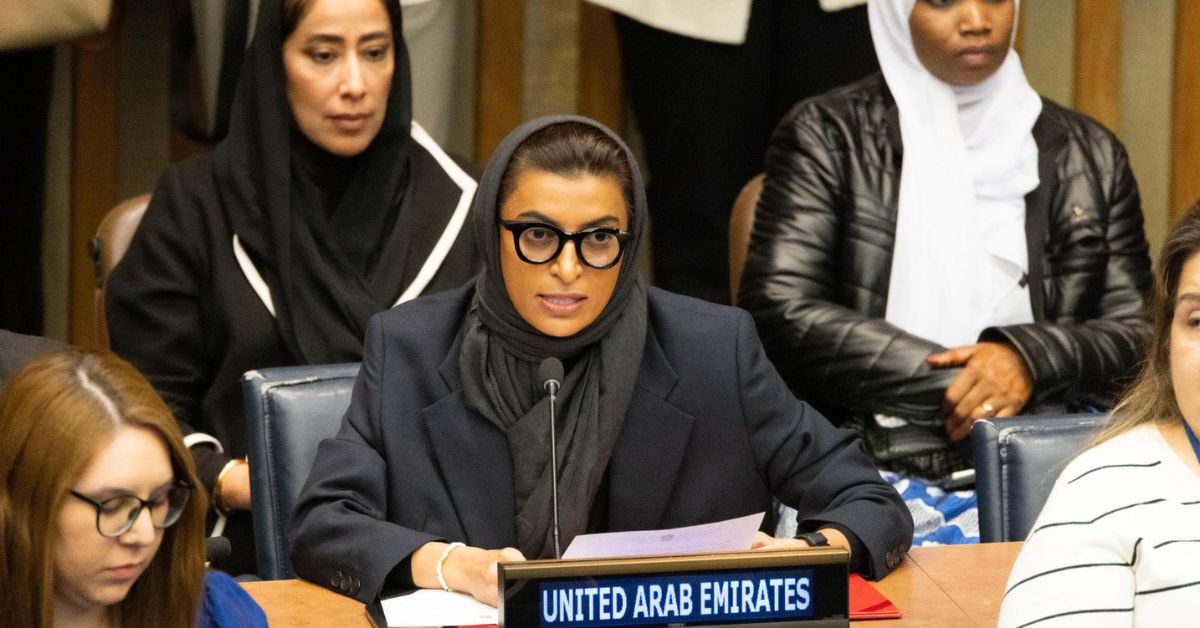NEW YORK – There is a need to strengthen and develop national institutions, social protection systems, and public services to ensure that women and girls have access to quality education and are put at the forefront of efforts to finance climate action, said UAE’s Minister of State Noura Al Kaabi.
She was leading the UAE’s delegation to the 68th session of the United Nations Commission on the Status of Women (CSW). The priority theme for CSW68 is “Accelerating the achievement of gender equality and the empowerment of all women and girls by addressing poverty and strengthening institutions and financing with a gender perspective.”
The UAE’s delegation included Mona Al Marri, Vice President of the UAE Gender Balance Council, Hanan Ahli, Managing Director of the UAE Federal Competitiveness and Statistics Center, and representatives from the UAE Ministry of Community Development and the Ministry of Foreign Affairs.
Delivering the UAE’s national statement in the CSW68 General Debate, Al Kaabi particularly emphasized the need to protect Palestinian women and girls.
“With projections that by 2030, 575 million people will still live in extreme poverty, we are finding ourselves in a race against time to achieve sustainable development and the 2030 Agenda,” said Noura Al Kaabi.
“We know all too well the detrimental impact this has had on the progress gained globally for gender equality and the empowerment of women and girls.”
Al Kaabi added, “Today’s frameworks to advance gender equality and women’s empowerment ring hollow in the face of the war on Gaza, which is killing Palestinian women and girls. Our commitment to the promotion and protection of women and girls worldwide must extend to them, too.”
She also participated in a Ministerial Roundtable on mobilizing financing for gender equality and the empowerment of all women and girls, specifically policies and strategies to end women and girls’ poverty.
She highlighted that the UAE has supported the launch of the joint UN Women and International Trade Centre’s Global Campaign on Gender-Responsive Public Procurement, which aims to reduce barriers that women entrepreneurs face when competing for public tenders to promote their empowerment, as well as their full, equal, and meaningful participation.
On the sidelines of CSW, Al Marri met with Sima Bahous, Executive Director of UN Women. In line with the longstanding partnership between the UAE and UN Women, she reaffirmed the UAE’s full support for the Executive Director and the agency, and explored new ways to continue their collaboration.
She also met with Pedro Conceição, Director of the Human Development Report Office at the UN Development Programme. In this year’s report, the UAE now ranks among the top 10 countries worldwide for advancing gender equality domestically on the Gender Inequality Index.
Al Marri also delivered the UAE’s national statement at the UN Security Council Arria-formula meeting on leveraging the synergies between the Convention on the Elimination of All Forms of Discrimination Against Women and the Women, Peace, and Security agenda.
The UAE, the UK, UN Women, DROPS, and ODI co-hosted a high-level panel discussion on reframing security from the perspective of women and girls living under the Taliban in Afghanistan.
Participants heard from Ambassador Lana Nusseibeh, Assistant Minister for Political Affairs and Permanent Representative of the UAE to the UN, Lord Ahmad of Wimbledon, UK Minister of State for the Middle East, North Africa, South Asia, and the UN, and Sima Bahous, Executive Director of UN Women.
The panel included Ambassador Mitsuki Shino, Deputy Permanent Representative of Japan to the UN, Ayesha Khan, Senior Research Fellow at ODI, Mariam Safi, Executive Director of DROPS, and a civil society representative from Afghanistan.

